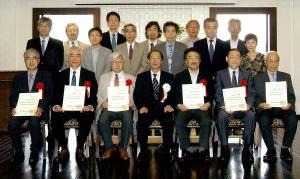Sokendai awards Honoris Causa to Prof. Motojima
17 Jun 2013
ITER Director-General Osamu Motojima was honoured for his long-term achievements as Professor in Plasma Science and education. DG Motojima is standing next to the university's President, Prof. Naoyuki Takahata.
On 5 June 2013, ITER Director-General Osamu Motojima was honoured for his long-term achievements as Professor in Plasma Science and education by receiving a degree honoris causa from the Graduate University for Advanced Studies of Japan.
The Graduate University for Advanced Studies (Sokendai) was founded in 1988 as the only university in Japan and throughout the world to offer exclusively doctorate-level training. It is made up of 16 national institutes and organizations such as the National Institute for Fusion Science, the National Astronomical Observatory of Japan, and the High Energy Accelerator Research Organization.
The university has the world's highest level of education, curriculum and syllabus taught by professors who are closely affiliated with research institutes and organizations throughout Japan, providing doctoral students with access to the nation's premier facilities for mathematical, physical and life sciences, as well as cultural and social studies.
Its Department of Fusion Science, established in 1992, is closely associated with the National Institute for Fusion Science (NIFS) which is home to the Large Helical Device (LHD).
Before coming to ITER, Osamu Motojima held a full-time professorship at NIFS from 1989-2003 in the Department of Fusion Science. In 1998, he took over responsibility for the LHD Program; during his time there the device achieved its first high-temperature plasma. Prof. Motojima continued to direct the LHD Program until April 2003, when he became Director-General of NIFS, crowning nearly twenty years spent within the Institute.
The newly distinguished honorary professors of the first university in Japan and throughout the world to offer exclusively doctorate-level training.
During the ceremony, the university's President, Prof. Naoyuki Takahata, congratulated all the awarded honorary professors, and thanked Prof. Motojima for coming all the way from France to attend the ceremony, for his long-time contribution at the highest level of responsibility for education in NIFS, and for having supervised many doctoral students (about 20). Prof. Takahata also stressed that this year is the 25th anniversary of Sokendai.
During his acceptance speech, Prof. Motojima said, "It is my great honour to be awarded honoris causa together with my old colleagues. Sokendai is well known throughout the world and I wish it further progress in its contributions to worldwide post-graduate education. ITER has a scholarship program of post-doctoral fellows supported by His Serene Highness Prince Albert of Monaco and has established a good relationship with several universities. It is the necessary condition for the success of the ITER project to have a high level of research and engineering, in addition to supporting education and training for the next generation. I will contribute towards this from now on too."
For the ITER Director-General, 5 June has become a date that he will always remember.



